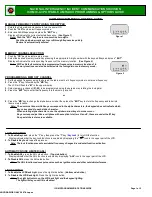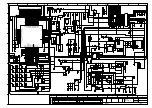
FCC ID: K66VX-5500V-2
Alignment
1/4
Vertex Standard Co., Ltd.
VX-5500V Alignment
The VX-5500 has been carefully aligned at the factory for the specified performance across the frequency
range specified for each version.
Realignment should therefore not be necessary except in the event of a component failure, or alteration of
version. All component replacement and service should be performed only by an authorized VERTEX
STANDSRD representative, or the warranty policy may be voided.
The following procedures cover the sometimes critical and tedious adjustments that are not normally
required once the transceiver has left the factory. However, if damage occurs and some parts are
replaced, realignment may be required. If a sudden problem occurs during normal operation, it is likely
due to component failure; realignment should not be done until after the faulty component has been
replaced.
We recommend that servicing be performed only by authorized VERTEX STANDARD service technicians
who are experienced with the circuitry and fully equipped for repair and alignment. Therefore, if a fault is
suspected, contact the dealer from whom the transceiver was purchased for instructions regarding repair.
Authorized VERTEX STANDARD service technicians realign all circuits and make complete performance
checks to ensure compliance with factory specifications after replacing any faulty components. Those who
do undertake any of the following alignments are cautioned to proceed at their own risk. Problems caused
by unauthorized attempts at realignment are not covered by the warranty policy. Also, VERTEX
STANDARD must reserve the right to change circuits and
alignment procedures in the interest of
improved performance, without notifying owners. Under no circumstances should any alignment be
attempted unless the normal function and operation of the transceiver are clearly understood, the cause of
the malfunction has been clearly pinpointed and any faulty components replaced, and the need for
realignment determined to be absolutely necessary. The following test equipment (and thorough
familiarity with its correct use) is necessary for complete realignment. Correction of problems caused by
misalignment resulting from use of improper test equipment is not covered under the warranty policy.
While most steps do not require all of the equipment listed, the interactions of some adjustments may
require that more complex adjustments be performed afterwards. Do not attempt to
perform only a single
step unless it is clearly isolated electrically from all other steps. Have all test equipment ready before
beginning, and follow all of the steps in a section in the order presented.
Required Test Equipment
RF signal generator: calibrated output level at
1000 MHz (0 dBµ =1.0 µV - closed circuit)
Deviation Meter (linear detector)
AF Millivoltmeter
SINAD Meter
Inline Wattmeter with 5% accuracy at 1000 MHz
Regulated DC Power Supply: adjustable from 10 to 17 VDC, 15A
50
Ω
Non-reactive Dummy Load: 100W at 1000 MHz
Frequency Counter: >0.1-ppm accuracy at 1000 MHz
AF Signal Generator
DC Voltmeter: high impedance
RF Sampling Coupler (attenuation pad)
AF Dummy Load: 4
Ω
, 20W
Oscilloscope
Spectrum Analyzer
IBM PC/compatible computer w/ VERTEX STANDARD CT-71 programming cable and CE-35 channel
programming editor.






















